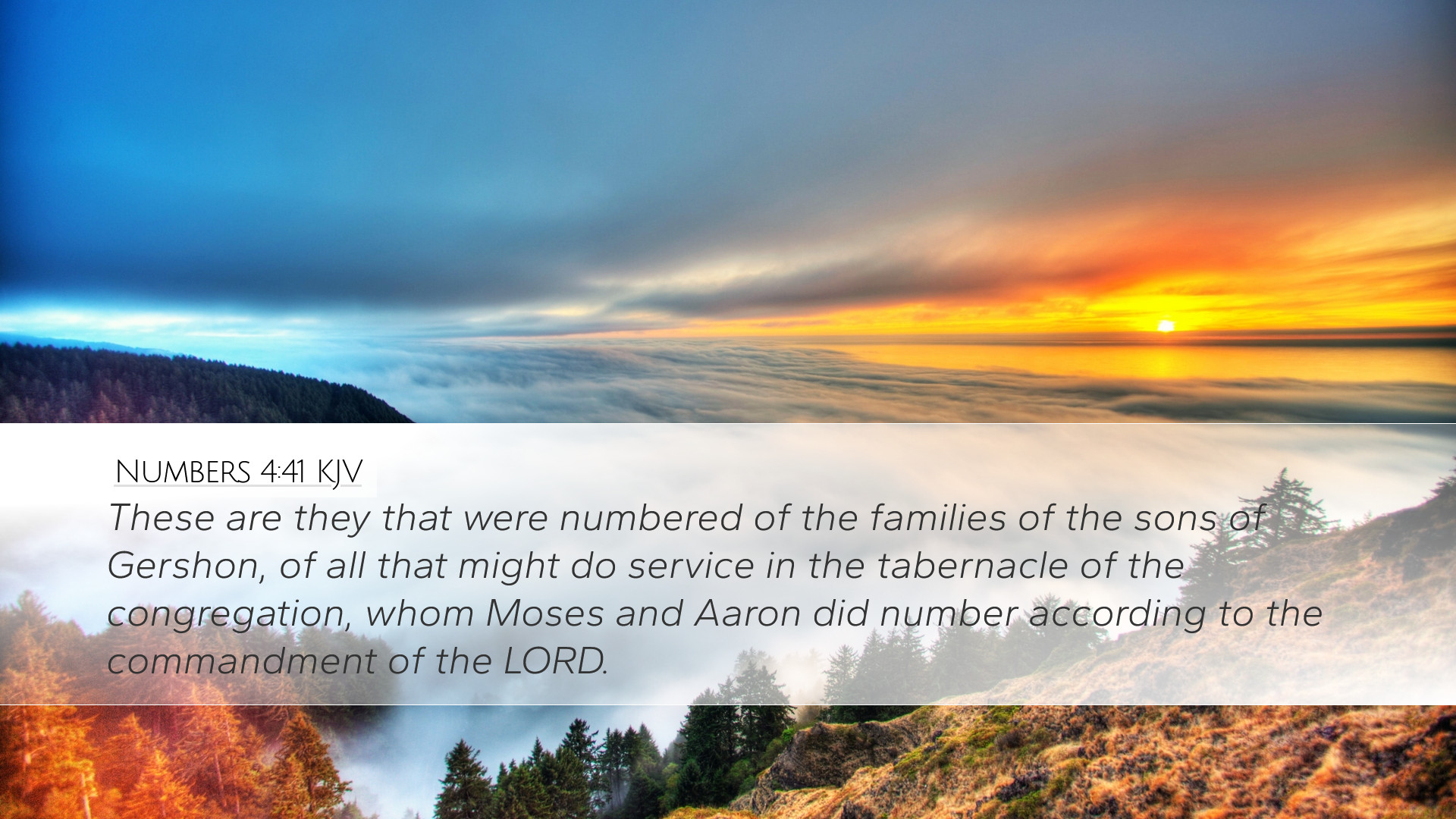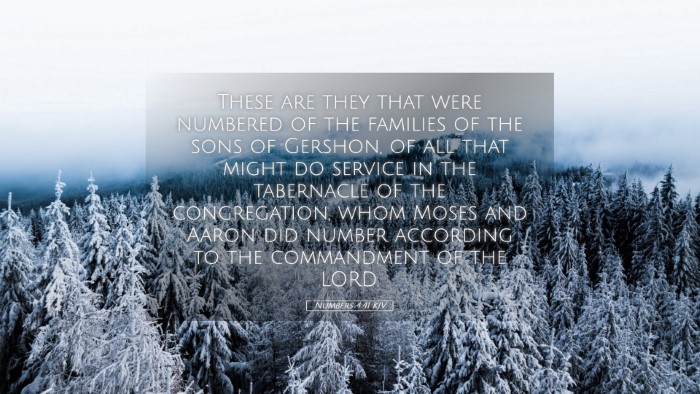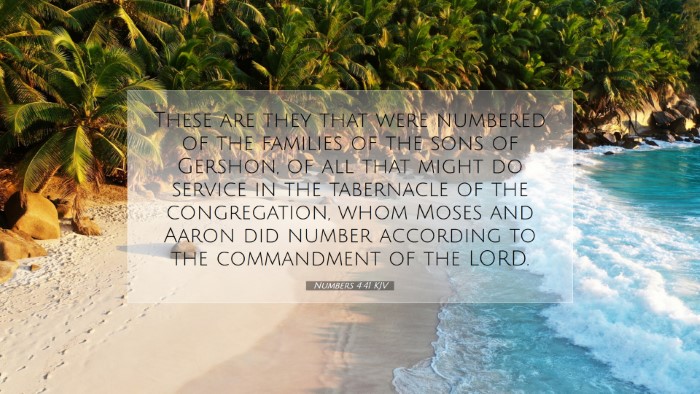Commentary on Numbers 4:41
Verse Reference: Numbers 4:41 - "And their cattle were thirty and five thousand, four hundred."
Introduction
This passage occurs within a broader context that outlines the responsibilities and numbers of the Levitical families. Here, we focus on the specific count of cattle attributed to the Merarites, one of the divisions tasked with transporting and caring for the tabernacle and its furnishings during the Israelites' wilderness wanderings. This verse, while seemingly trivial at first glance, offers profound insights into divine order, stewardship, and community structure.
Contextual Analysis
The Book of Numbers serves as a record of censuses of the Israelite people and their organizational structure as they prepare to enter the Promised Land. Within this context, Chapters 3 and 4 detail the duties assigned to the Levites and their subfamilies. Here, we see a specific enumeration of resources that are under divine authority, emphasizing the significance of both the people and the things God has entrusted to them.
Insights from Matthew Henry
Divine Order: Matthew Henry notes that God’s detailed accounting of the Levites' resources demonstrates His meticulous concern over the organization and management of His sanctuary. By counting the cattle, the Israelites acknowledge that their possessions ultimately belong to God and are to be used for His glory.
Stewardship: Henry emphasizes the importance of stewardship, asserting that these animals are not merely resources but part of the divine arrangement to support the sacred tasks of the Levites. The cattle serve practical purposes, such as transporting tabernacle materials and providing offerings, teaching us the principle that our resources are to be managed in service to God.
Insights from Albert Barnes
Census Significance: Albert Barnes points out that the number of cattle signifies the strength and sustainability of the Levitical duties. The cattle, numbering thirty-five thousand four hundred, not only support their physical needs but also constitute a testimony to God’s provision for His people. This abundance is a symbol of God’s faithfulness in caring for His chosen ones.
Community and Responsibility: Barnes notes that this verse reflects the communal responsibility among the Israelites. Each family of the Levites is entrusted with specific duties and resources, reinforcing the idea of collaborative service in the body of believers. This approach indicates that every member has a role in the larger narrative of God’s people.
Insights from Adam Clarke
Symbolism of Cattle: Adam Clarke interprets the cattle as a symbol of service. He elaborates that while the physical livestock supported the Levitical roles, they also represent the spiritual sustenance provided to God's people. This reiterates that every aspect of life, whether material or spiritual, is intertwined with the worship of God.
Numerical Importance: Clarke emphasizes the importance of the numbers mentioned, stressing that they convey a sense of completeness and order within God’s system. The specific count signifies that God has everything in count and control, reminding believers today that nothing is insignificant in His eyes. Each part of creation, including the smallest detail, plays a vital role in His divine plan.
Theological Implications
- God's Sovereignty: This verse affirms God’s sovereign control over His people and their resources. Just as He accounted for the cattle, He oversees all aspects of life, reminding us believers of His continual provision and oversight.
- Importance of Worship: The cattle were integral to worship, used in sacrifices (as mentioned throughout Leviticus). The verse highlights the essential nature of worship and the means through which it is expressed, prompting an examination of how contemporary Christians engage in worship with their resources.
- Community Structure: The organization among the Levites reflects the importance of structure within church leadership and community. It encourages modern readers to consider how their own churches function, ensuring that everything used in service is adequately accounted for and maintained.
- Call to Stewardship: This passage inspires each believer to be a good steward of the resources God has provided, whether they be financial, physical, or spiritual. It is a call to recognize that everything belongs to God and is for His use, urging us to contribute generously to the work of the church.
Practical Applications
For pastors, students, and theologians, Numbers 4:41 encourages both reflection and action:
- Reflect on God's Provisions: Take time to observe how God has provided in your life and ministry. Acknowledge the 'cattle' (resources) He has given as tools for worship and service.
- Encourage Community Involvement: Foster a sense of community and responsibility within your church echoing the collaborative efforts of the Levites. Ensure that members find a place to contribute to the mission of the church.
- Teaching on Stewardship: Implement teachings on stewardship in your sermons and classes, helping congregants to understand the importance of managing their resources wisely for God’s glory.
- Recognizing Divine Order: Emphasize the importance of order in worship and church structure, using the organization of the Levites as a model for aligning church practices with divine principles.
Conclusion
While Numbers 4:41 may initially appear as a simple statistic regarding cattle, it embodies significant theological truths about God’s sovereignty, provision, and the community of faith. By drawing insights from respected public domain commentators, we can glean deeper meanings and apply these principles within our ministries, encouraging a holistic understanding of stewardship and worship in the life of the church.


